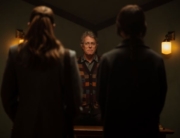Omar spins a fresh take on thrillers and star-crossed romances set along the Israel/Palestine security wall. Omar (Adam Bakri) jumps the barrier that has divided his town, and sneaks down labyrinthine stone alleys—not for the stereotypical purpose to carry out terrorism, but for love. He arrives and knocks on the door of Nadja (Leem Lubany) for a sweet flirtation.
Her older brother Tarek (Eyad Hourani) has little patience for love. He agrees to hide weapons in his house, and he directs Omar and their other childhood friend, Amjad (Samer Bisharat), to train, half-seriously, at night for guerrilla actions as they hang out together. Amjad is a joker (his Godfather imitations are funny), but the war games turn serious one night when one of them actually shoots an Israeli soldier, and the repercussions turn distressingly real. Chased down by soldiers, with heart-pounding tension, Omar is arrested and subjected to a tough interrogation by Agent Rami (Palestinian-American actor Waleed Zuaiter) to answer the persistent question, “Who shot the soldier?” Omar is defiant that he will never confess, but he gets worn down by the threat that he will only be released if he agrees to collaborate.
From then on, the tensions of loyalties are tested amidst paranoia and jealousy that subsumes the politics. Each friend is a victim, caught between personal and group or family ties exacerbated by dead end options. Writer/director Hany Abu-Assad filmed mostly in his home town of Nazareth. (He’s best known for his 2006 film Paradise Now. Both that and this film have been nominated for the foreign-language Academy Award.) At the New York Film Festival, he said that he was inspired by a newspaper article, but he wanted to explore the “human story” behind the headlines. He successfully makes a point of humanizing each main character.
The agent’s relentless questioning is interrupted by phone calls from his wife. Omar is no aimless unemployed angry young man, but works at a bakery. Trapped in cultural limits, high school student Nadja muses “I dream of leaving,” and together she and Omar fantasize about somehow reaching New Zealand. (Cue “Somewhere a place for us.”) They frequently court while she walks home from high school or at the school yard fence, emphasizing that they are still teenagers (played by teens in their striking film debuts) making rash, impulsive decisions where some semblance of normality continues under oppressive conditions. Who did or did not pass a note or misinterpreted a conversation will have heart-wrenching life and death consequences. Betrayal is personal and, unfortunately, deadly.
Much as how Norman Jewison’s In the Heat of the Night (1967) imbued a social consciousness within a mystery that contained an intimate secret, Omar is a humanistic thriller with a political conscience.







Leave A Comment